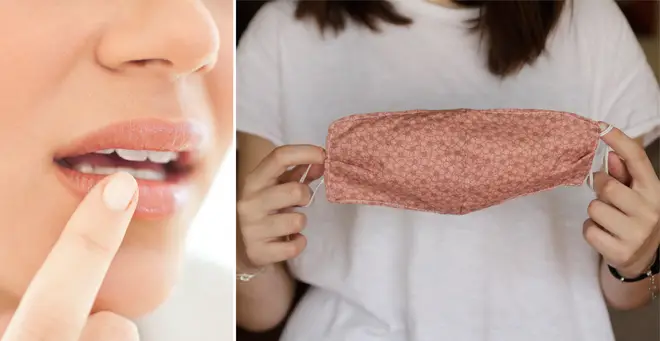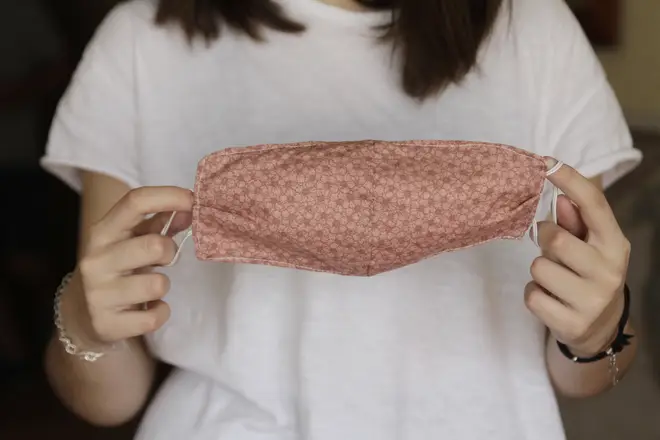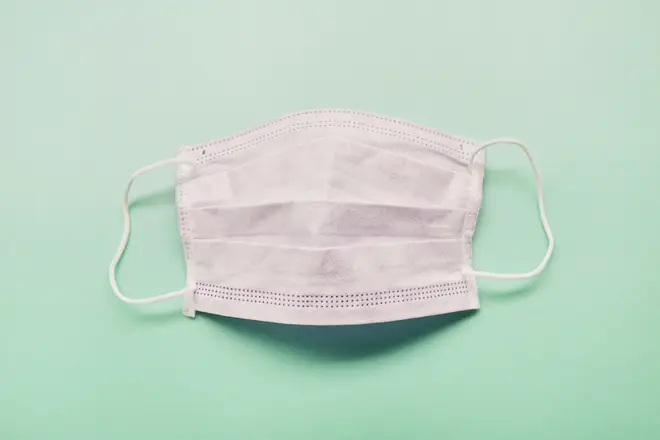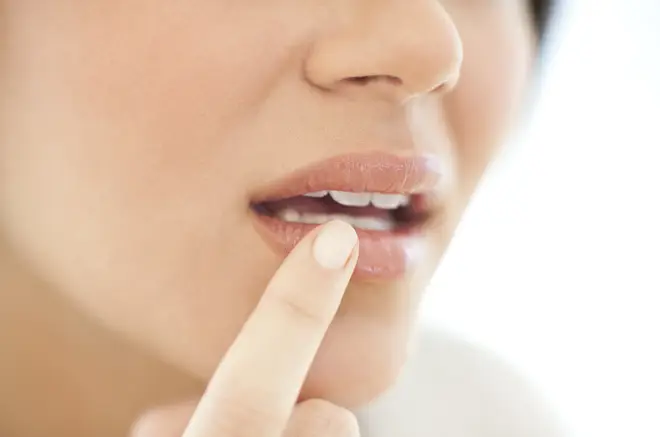On Air Now
Early Breakfast with Lindsey Russell 4am - 6:30am
6 August 2020, 15:33

Expert advice on how to prevent cold sores, and whether your face mask could be triggering them.
Face masks are currently mandatory on public transport and retails shops in England, meaning many of us will be sporting coverings for a significant proportion of our daily lives.
Some people have encountered skincare problems - such as spots and rashes - while wearing face masks, and there have even been claimed that they can trigger cold sores in people who already have the herpes simplex virus.
Read more: What is maskne and which treatments and products get rid of chin, mouth and nose spots?
But is this true? We spoke to By Dr Sadaf Hussain, GP and founder of private clinic bookings service ZoomClinic, to find out more.

"There are no studies that I am aware of that directly correlate cold sores with face masks," she says.
The doctor adds, however, that the increased heat exposure caused by the face mask could lead to their development.
Dr Hussain continues: "However, wearing a face mask for long periods may result in increased heat exposure to your lips and skin under the face mask. T
"his heat may contribute to skin cracking and triggering cold sores to develop. However, you must still wear a face mask as advised by the government as the risk of COVID-19 are significant to you and others around you."
Read more: Hair expert reveals how to protect your locks from sun damage and harmful UV rays
Only those who already have the herpes simplex virus will get cold sores.
Dr Hussain says: The herpes simplex virus is categorised into 2 types: herpes simplex virus type 1 (HSV-1) and herpes simplex virus type 2 (HSV-2).HSV-1 is mainly transmitted by oral-to-oral contact to cause oral herpes (which is also known as “cold sores”), but can also cause genital herpes.
"Herpes infections are highly contagious when symptoms are present but can still be transmitted to others in the absence of symptoms."
"Once you have the virus, it stays in your affected cells for the rest of your life. Sometimes it causes a cold sore but it is mostly dormant. According to the WHO ( World Health Organisation ) most people are exposed to the virus when they're young after close skin to skin contact, such as kissing, with someone who has a cold sore.
"Most people won’t have any symptoms until they are much older. You most likely will not know if you have the herpes simplex virus until you get a cold sore. Cold sores are common. According to the WHO, in 2016, an estimated 3.7 billion people under the age of 50, or 67% of the population, had HSV-1 infection (oral or genital)."

Dr Hussain says: "After you have been infected with the virus, there is no certain way to prevent further cold sores."
However, there are some measures you can take that may help to stop them from coming out.
She advises: "When you have a cold sore, make sure to wash your hands often, and try not to touch your sore. This can help keep you from spreading the virus to your eyes or genital area or to other people.
" Keeping your health optimal can help prevent a cold sore flare-up. Make sure to have a healthy balanced diet which includes plenty of fruit and vegetables. Drink plenty of fluids to keep well hydrated. Get regular exercise 3-5 times a week. Try to get plenty of rest and adequate sleep.
"Try to manage or reduce stress. Self care can mean different things to everyone. Try to apply your version of self care into your lifestyle daily. Incorporate relaxing routines into your daily routine. Use lip balms to keep your lips well hydrated and to avoid cracked lips.
"The British Association of Dermatologists recommend using a sunscreen on your face and lip with at least an SPF30 UVB protection, and 4 out of 5 stars UVA rating. Optimise management of medical conditions. Speak to your GP about any chronic conditions and review your care plans."

Despite all these measures, you may still develop cold sores.," Dr Hussain says.
"They usually start with a tingling, itching or burning before the appearance of the sores themselves. After initial infection, the blisters or ulcers can recur again and again over time. The frequency of recurrences is different from person to person.
"A lot of people have used topical applications of aciclovir cream as soon as they sense the initial tingling sensation. However, some studies have not supported topical applications to show any improvement in healing time or reduction in symptoms.
"Generally cold sores tend to resolve within 10 - 14 days without treatment and generally only cause mild symptoms.
"Oral aciclovir as treatment may be more helpful but studies have shown it is more helpful if taken early on and only in the first episode of cold sores developing.
"Also, remember, generally oral medications are more likely to result in side effects than topical applications. In those unfortunate individuals who develop frequent recurring cold sores, taking oral aciclovir as a prophylactic measure can help reduce recurrence of symptoms significantly."
NOW READ:
Makeup artist shows exactly how to prevent annoying red marks after wearing glasses